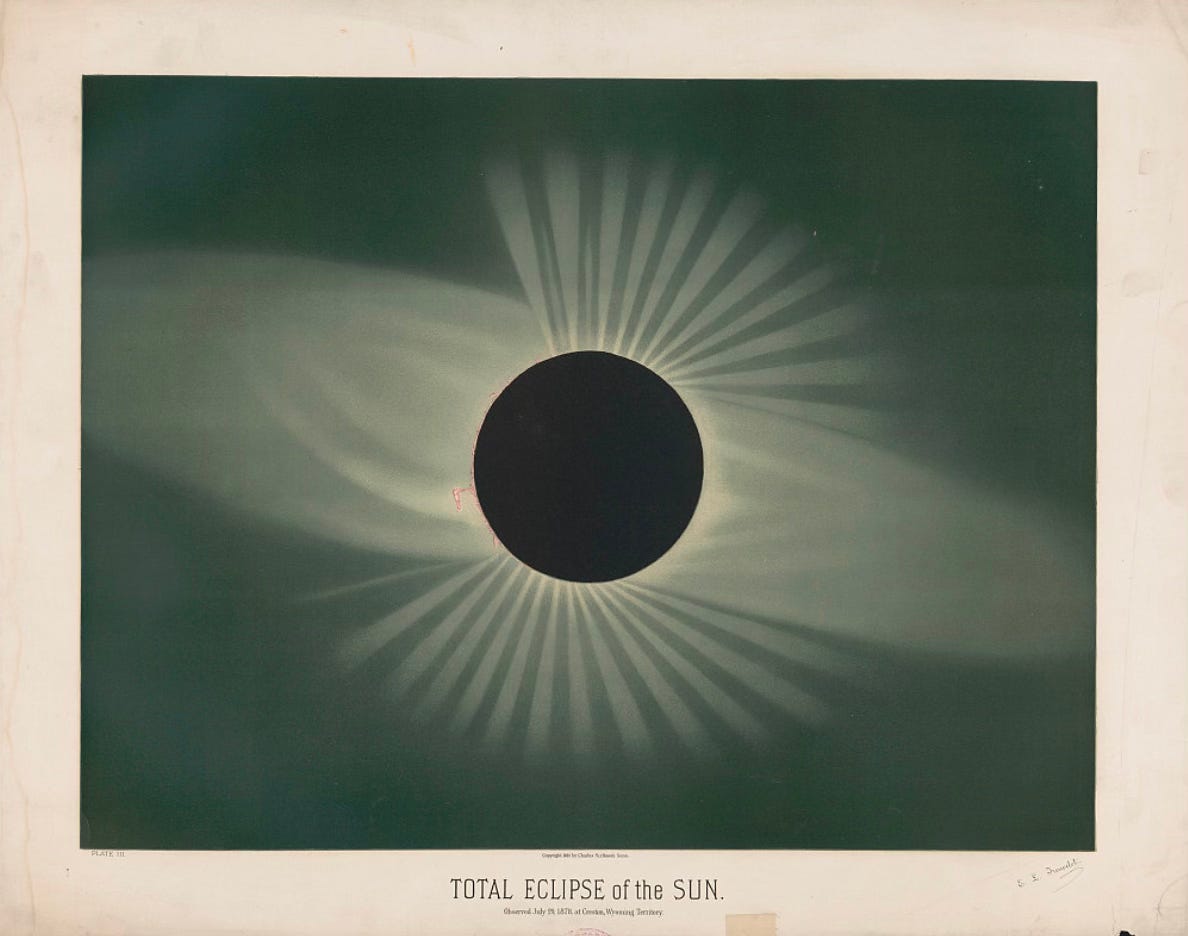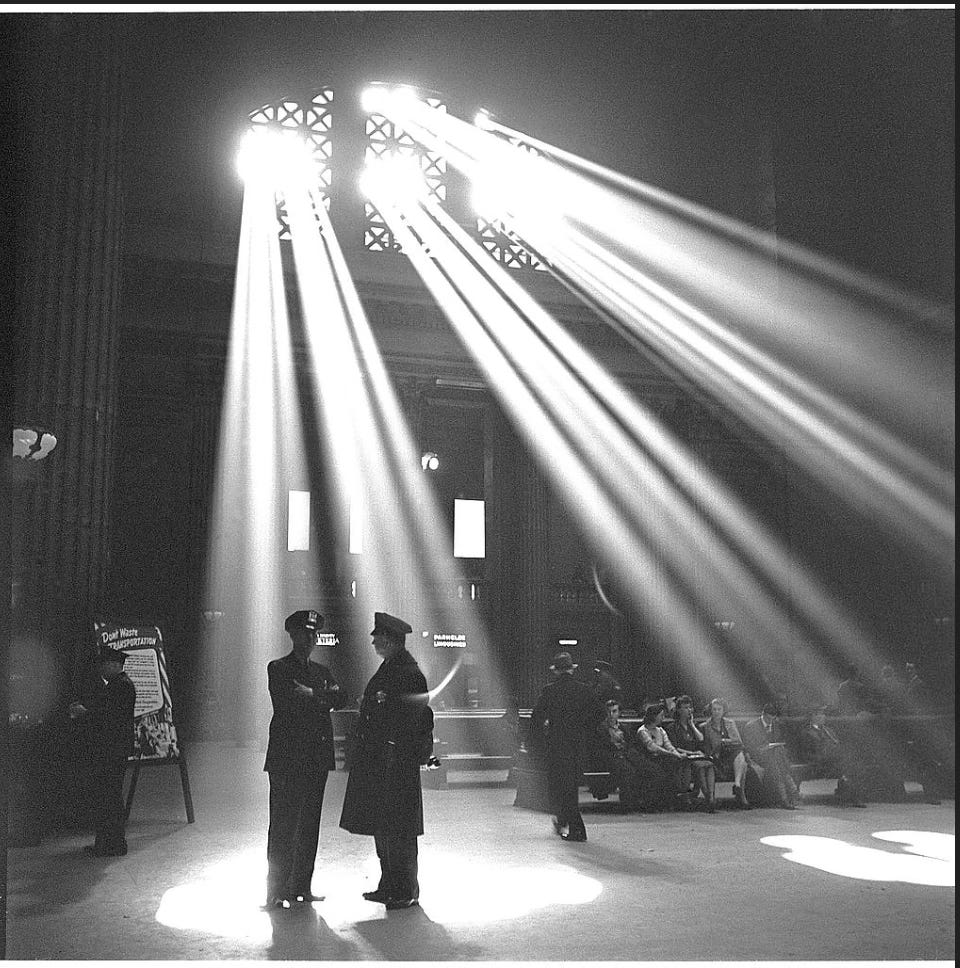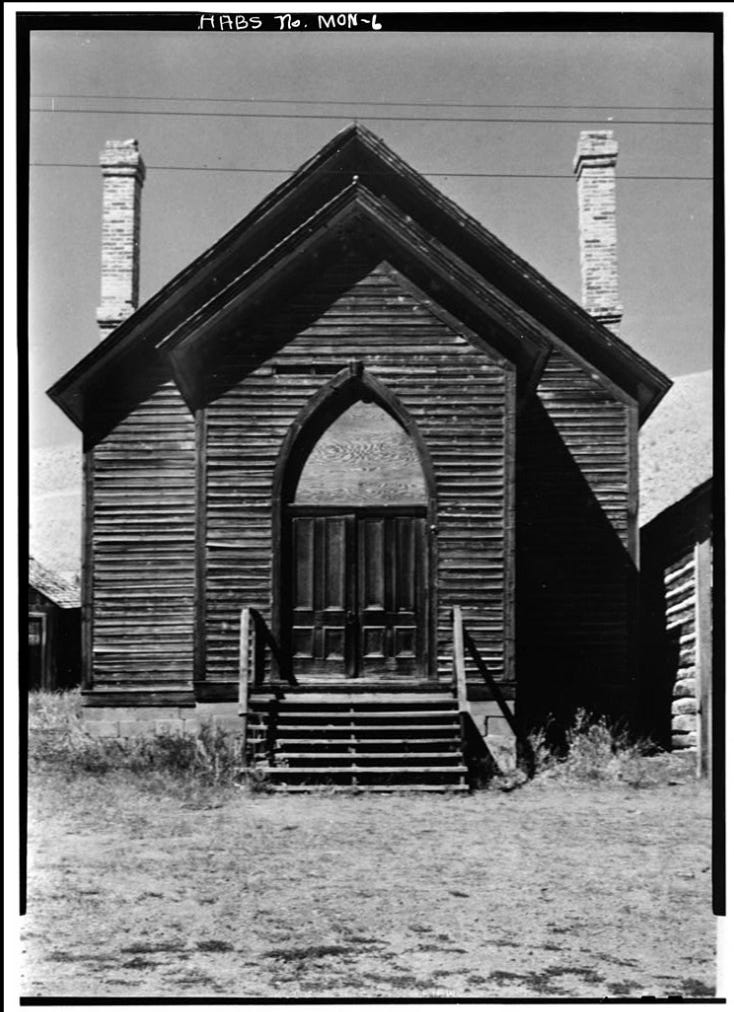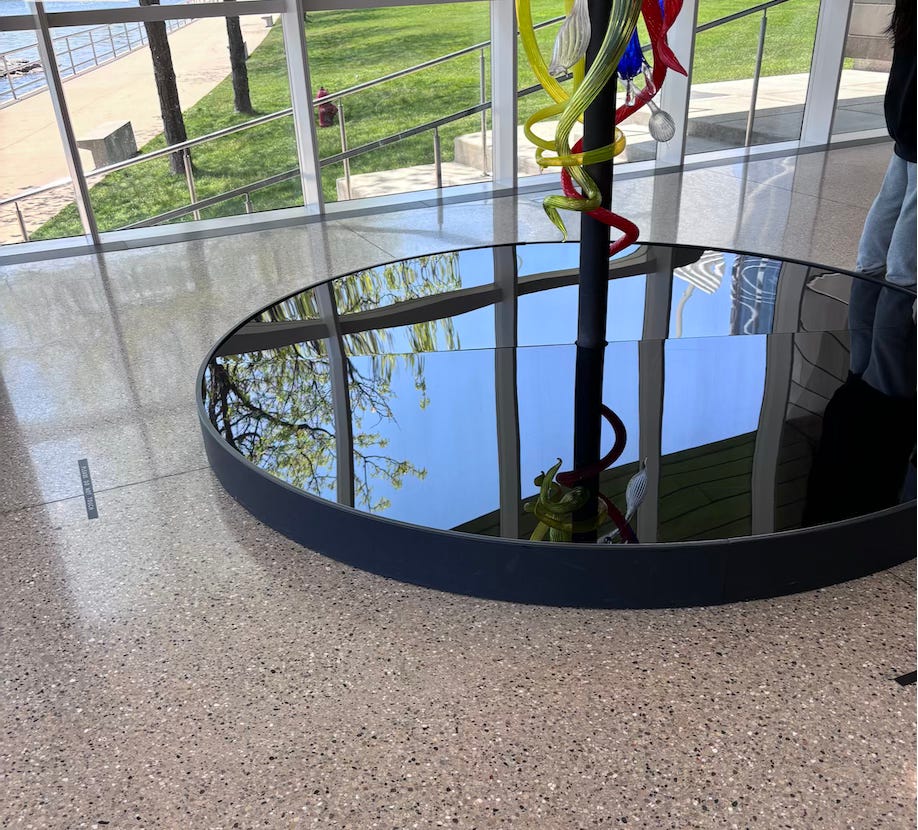There are so many things I don't understand about human beings and some nights it's helpful to say a few of those things out loud
Psalms of hope, psalms of exhaustion, psalms of shrugging
A forewarning. I’m going to be discussing faith and theology and the general idea of a God (or something like a God), which means that this piece won’t be for everybody. That’s ok. If this kind of language is useful or interesting to you, great. If not, that’s also great. No harm in skipping this one.
Before I talk about God, though, I want to talk about art. Well, sort of. I want to talk about watching a bunch of eleven-year-olds listen to one another talk about art.
Last Friday, I tagged along on a fifth grade field trip to the Milwaukee Art Museum. My son’s school participates in that institution’s Junior Docent program, which means that all the fifth graders got to choose a single art piece, research and re-create it, and then come back to the museum to present both their re-creation and analysis in front of their peers. A delightful experience all around.
I could tell you about how lovely it was to see those eleven-year-olds show off their art, ask each other thoughtful questions in two different languages, and just generally revel in the sheer grown-upedness of the experience. But for now I’ll just relate that mid-way through the day, one of the newer girls— a kid who has only lived in the U.S. for about six months, a kid who fled a country that’s often in the news for instability and violence— got up to present her artwork. And she was nervous. So nervous. Nervous in that distinctly early-adolescent way that, when you witness it as an adult, immediately launches you back to sense memories of acne and braces and tiny daily terrors.
The girl had created an impressive facsimile of a complicated blown glass sculpture, a Chiluly, but her re-creation broke shortly before it was time to present. She then had to explain the whole situation to people that she was still learning to trust in a country that still felt new. So she froze. And she stayed frozen, for a good minute or so. And the museum employee, who only spoke English, tried to help. But that only put more focus on the girl, which of course only made her feel more embarrassed. You know the cycle.
What did help, though, was that another student stood next to her, whispered something in her ear, and then stayed by her side as she barreled through her presentation, burying her eyes in her script but very much getting through the task at hand. What helped even more was her peers offering thumbs ups, listening attentively and asking her sweet questions in Spanish. They didn’t make a show of it, but they all had her back.
In the end, the girl smiled as she received her official Junior Docent pin. And then she returned to the crowd, where she felt safe. A few minutes later, she was applauding her peers. And listen, I could say a whole lot of words about what we owe each other as human beings but that feels like a pretty good summary.
There is a version of that story where the moral is something about how much adults can learn from kids— that there is a sweetness inherent in youth that us grown-ups need to re-discover. To tell that story, though, would be to flatten the reality of my son’s cohort. There are many moments— over the course of their shared elementary school lifetime— when they have been felicitously kind to one another. But they have also been petty and selfish. Friendships have been ended over minor indignities. Traumas and insecurities have been passed from child to child. They have, like all the best reality TV characters, claimed to despise drama while cultivating it at every possible turn.
I could tell you about the girl whose mom purchased grocery store cupcakes for her birthday, sending her off with the instruction to give one to each of her classmates. She didn’t follow those instructions, because sometimes we human beings are agents of chaos and cruelty. Instead she made a whole show out of only giving some kids cupcakes, of telling other kids not just that they were unworthy of cupcakes, but about the details of their unworthiness. “I just don’t like you, so no cupcake for you” There are meaner ten word sentences, I suppose, but not too many.
Sometimes we see a peer at their most vulnerable and we do everything we can to make them feel safe. Other times, we feel scared and alone and try to punish another human being in our stead. Some days there are enough cupcakes to go around, but that doesn’t mean that everybody gets one.
I promised that this would be about God, and it is. I don’t know if that’s a concept that’s meaningful to you, but it is to me. I believe in a God, but the God I talk to every night doesn’t really care if anybody believes in them or not. I find it useful to believe in something celestial, because there’s nothing I love more in this world than other human beings. I am so in love with all that we can be— tender huggers, elicitors of laughter, creators of art in all its forms, designers of skyscrapers and layer cakes and arpeggios— that I can imagine how there might be a tiny piece of divinity in all of us.
I probably wouldn’t be all that interested in faith, though, if that was all there was to us. We are very beautiful, but we are also immensely awful. We hurt each other so damned much— individually, for sure, but also through our addiction to systems and hierarchies and myths that spread harm exponentially. We invent the worst possible ideas: wars, fist fights, prisons, slurs. When I say that I believe in a God, what I am also saying is that I find it useful to talk to that God, and for me at least that involves far more psalms of lamentation than praise. I find it helpful to have a God to whom I can say, in essence, “What the hell? Why couldn’t you create a far less murder-y and vindictive species than us? Why did you have to make us so selfish? Why did you have to make us so scared?”
This is one of many moments when the non-theists amongst you are likely cursing my quaint belief in an omnipotent creator of the world. You are no doubt ready to remind me that our brains, for all their glory and fallibility, are the product of evolution, that there’s a story about what enabled some but not all of our ancestors to survive the mammoths and saber-toothed tigers. And that’s all well and good. Again, for me at least, none of this theology business is about being right. Some nights, you just start talking and it feels good to imagine that those words are going somewhere.
I have been thinking about faith more than usual these days. That’s because of the wars, of course. The other day I returned home from Quaker Meeting with a new “War Is Not The Answer” sign for our front yard. My son, the one whose classmates sometimes comfort one another in art museums and sometimes dole out cupcakes like petulant tyrants, asked me which wars are going on right now. I tried to list them. Gaza, of course, then Sudan and the Congo. And then I drifted off… “the thing is,” I stuttered, “every time I’ve tried to figure that out, I’ve realized that the actual answer is far larger than I ever imagined.”
Yesterday, I read a couple articles about Haiti. The gangs in Port au Prince have been terrifying for quite some time, but the current conventional wisdom is that they are more dangerous now that they have started acting and dressing less like gangs and more like armies. I’m not an expert in geopolitics, but that sounds to me like a good argument for the inherent danger posed by any fighting force, sanctioned or not. You know who else’s fighting force looked like an army and plundered like a gang? Colonial France.
Back to the duality. Again, I remind myself, the same species that invented poverty and murder and a million myths of hierarchy and exclusion also invented sonnets and penicillin and the idea to celebrate one another’s birthdays and that moment when you’re in a bar at 1:00 AM and “Don’t Stop Believin’” comes on and you didn’t even like that song but soon your arm is around a stranger and you’re both shout-singing “Streetlights! People!” and in that moment both of you are a million miles away from your most shameful instincts.
We have our moments, don’t we? If only we applied ourselves.
My favorite theologian is Will Campbell, the Southern country preacher, civil rights activist and prickly rapscallion whom I shouldn’t try to summarize in a sentence. Campbell had a pithy line that he’d roll out whenever he was asked about his theology, something about how we’re all bastards but God loves us anyway. That’s always resonated with me, but all the more so since I’ve become a parent.
Here’s another story about my son’s classmates. The two years immediately following pandemic lockdowns were particularly tough for them, which isn’t surprising. Disaporic trauma suddenly became shared trauma; too many emotions shoved into the space of a single classroom. One day in third grade, my son came home and related that his earnest, deeply loving (and very young) teacher had, after a looooong semester, finally blurted out “You all, I’ve tried everything! I don’t know what else to do!” My son, who perhaps took on too much of a burden for the class as a whole, looked at me, clearly dumbfounded and said, “You know, I thought about it for a while and I agree with him!”
The God that I talk to, when I putter away in a pre-sleep stream of consciousness, sounds a lot like that teacher. Some nights, I play out both sides of our conversation. Another sacred and profound human predilection— the urge to put words in God’s mouth.
“You could have made us less selfish, you know?”
[God shrugs, but not in an apathetic way, more in a deeply tired parental way]
“Like I want to be kind and empathetic. I don’t want to be selfish, but I’ve got this huge list of friends I should be reaching out to and people to whom I’ve made promises and organizing projects for which I should be showing up but instead I just watched another Youtube video where people eat food and talk about it. I even owe my own mom a text! Why am I like this?”
[Another shrug; it’s not clear if God is more disappointed with me or themselves. I sense, in that second shrug, that God notices that I’m talking about myself and not about the wars. God could judge me, but I don’t think God is surprised].
“I’ll try again tomorrow, I guess.”
My childhood denomination, the United Methodist Church, has been in the news. Over the course of the last year, two changes have come to pass, neither of which I could have imagined twenty years ago. After years of organizing and struggle, the church that was always so kind to me but so unkind to queer Methodists finally voted away its most homophobic prohibitions. The UMC only did so, though, after thousands of its conservative congregations absconded for a new splinter denomination, the Global Methodist Church. Growing up as a far-left teenage theist, I loved that my denomination dreamed of maintaining a big tent, but hated the all-too-predictable pattern of who was left out in the cold. I cried the day I read the news about the new General Conference decision, but they weren’t uncomplicated tears. The denomination had become more loving, but only by becoming a little bit smaller. A queer kid in a college town in Montana might be more likely to have a home in the church now, thank God, but a queer kid in rural West Texas might find themselves even more outside the fold in their now Global Methodist congregation.
Even when there is good news, it can feel like too little, like we just wasted another blessed day with our hatred and our smallness.
But what is faith if not the ability to go to bed in darkness and trust that the sun will rise again? What is being human if not holding two things in our hand at once— an awareness of how tiny we can be in our worst moments and how gloriously expansive we can be in our best? What is political engagement and social concern if not a sacred, exhausted promise? We will keep trying. We will be imperfect in our trying. But still. Tomorrow is coming. Tomorrow is a gift. Tomorrow we shall not be whole, but maybe we can mend a few more busted shards back together. Tomorrow we will notice that our newest friend feels alone, and we will stand by her side.
SO MANY END NOTES:
You know my book? The one that, amongst many other things, about wrestling with faith and politics and my own foibles? I would still very much like for you to buy it (and also do other things to help it- review it, share it with your friends, spread it around your communities, be they faith-based or faith-allergic).
Do you know where I’m writing this piece from? A train to the Twin Cities! Why? Because I’m on book tour, baby!
Tomorrow May 23rd, in Minneapolis. Look at this line-up of co-sponsors: Southwest Alliance for Equity! Friends for a Nonviolent World! The Minneapolis Friends Meeting! Comma Books! You all, it’s gonna be a cozy good time. 7:00 PM at the Friends Meetinghouse (4401 York Ave. S.). RSVP here! [Last week, I said this event was at 7:30 PM but don’t believe my lies— it’s 7:00 PM, I promise].
Next Thursday, May 30th, I’m in New York for the Literary Swag book club. That’s a membership group (but a great one). It’s a private event, but it’s also the only one I currently have planned in New York so if you really want to join let me know and I think we can figure something out. Is there any good food in New York? I’ve never heard about it. I’ll probably grab some Sbarro in LaGuardia.
June 4th, I’m in the Literal Redwoods (well, not the city of Redwoods, I mean the town with the redwood trees)! Mill Valley, CA at the Mill Valley Public Library! 6:30 PM! Shout out to Sausalito Books by the Bay and Madrona Bakery for being co-sponsors here! Last week, I didn’t make a big enough deal about how that link up above is an RSVP link. Please RSVP. It helps the library know how many chairs they’ll need.
June 5th, 7:00 PM, I’m in Oakland, CA and we’re gonna do a “Garrett Bucks and Friends” workshop/hang-out/book talk/good vibes time. Where? Temescal Commons, 480 42nd Street. You all, it’s gonna be so rad. RSVP for that one here.
Residents of Washington State! Or people who care about residents of Washington State! Did you know that there is a grassroots campaign to get y’all actual universal healthcare? It’s true. It’s called WHOLE WASHINGTON and I’m leading a public, virtual organizing training for them on June 19TH at 6:00 PM PT. RSVP here.
This whole operation is, in fact, my day job. I couldn’t do it without folks like you supporting my work. Buying the book helps quite a bit towards that end, but so too does upgrading to a paid subscription. Would you consider it?
Speaking of paid subscribers, my gut is that this week we’ll do the weekly community discussion on Friday instead of Thursday (just because this piece is coming out so late). I may change my mind but wanted to give y’all a heads up.
We’re about to kick off the White Pages Summer Movie Series. The list is still evolving, but here’s a sneak peek of the draft line-up. I AM accepting pitches for guest essays on any of these films (and I pay better than actual publications! thanks again, subscribers!) so if you’ve got a cool take on one of these (esp. as it relates to Whiteness, etc.) send me an email! garrett@barnraisersproject.org.
Song of the week! Song of the week! Have I picked this one already? Maybe. This is the song about God I think about more than any other. More specifically, it’s the song about an angry White guy in a suddenly gentrifying West getting drunk, driving to the desert, pointing a gun at the sky, and threatening to shoot God, which is a very real thing that people in places I’ve lived. I hope the guy in the song missed his shot.








This was such a beautifully written and thoughtfully meandering piece that really touched my heart. You so beautifully captured how complex humans are, how we are capable of such horrors and such transcendent selflessness too and the enigma of it all. I have thought before that maybe I believe in God because of what divinity shows us about humanity. Thank you for sharing your thoughts and writing!
As someone who says my faith is in humanity, which means I get my heart broken regularly, I appreciate how you talk about God. Even if I don’t use that language, your grappling resonates.
I also understood the New York joke this time. 👊